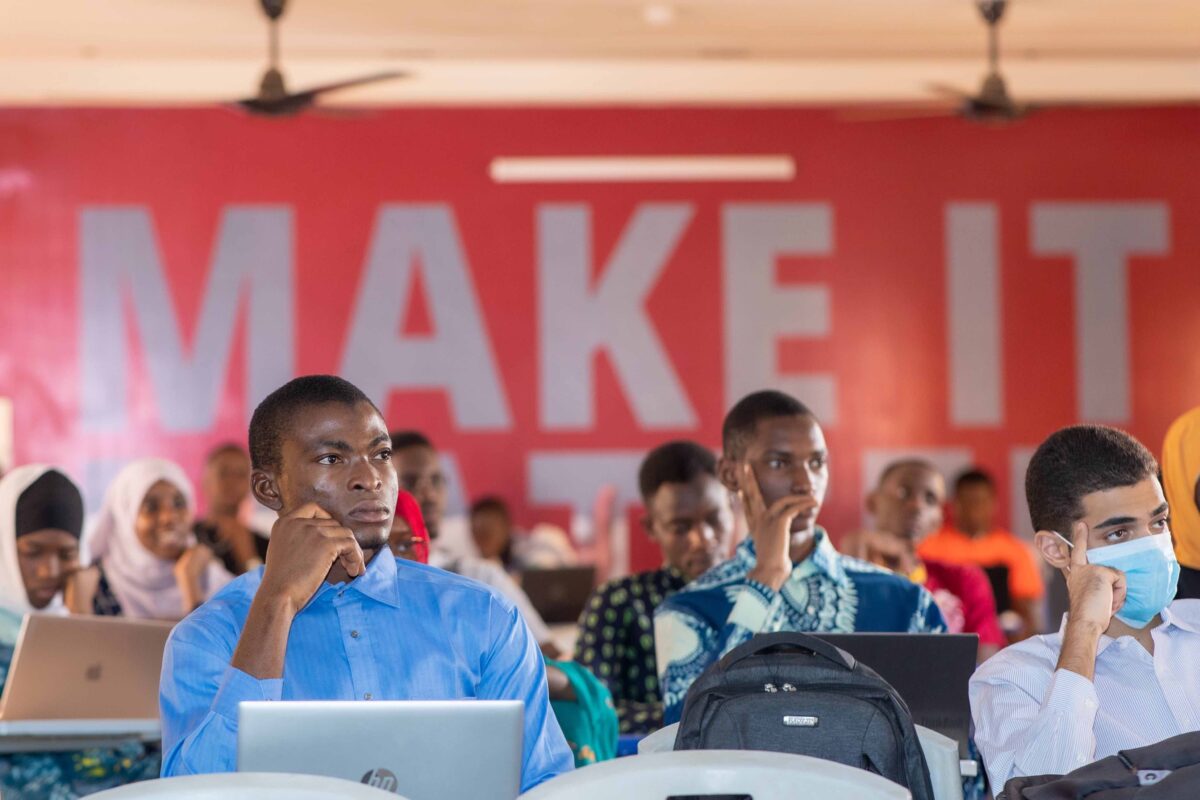When my plane landed in Lagos, Nigeria, in 2005, the man next to me leaned over to say: “Now this is a boom town.”
I was tired after an overnight flight. Outside, the airport looked modest. I smiled quietly, but his comment stuck with me. What boom?
I didn’t know then how right he was. Today, sprawling Lagos’ population is 16 million — it was barely 300,000 in 1950. Nigeria, with fellow African nations Congo, Ethiopia and Tanzania, is one of just eight countries that will contribute more than half of the world’s population growth between now and 2050, according to United Nations projections.
“Africa matters,” said Kwame Yamgnane, the CEO and cofounder of Qwasar, a coding bootcamp founded in Silicon Valley that is staking a claim on the continent. Yamgnane’s father was raised in French-speaking Togo and mother is a native of France, where he was schooled. (Fun fact: Yamgnane may be the descendant of an Egyptian pharaoh.)
Africa’s still-booming population will have an outsized impact on the global workforce, especially in technical roles. The world had 24.3 million software developers in 2021, and, according to industry estimates, that figure is expected to cross 45 million by 2030.
Barring total AI upheaval, the world can meet that demand in only two ways: Train a higher share of workers for tech fields and make a lot more people. It’s unlikely we’ll do much of the latter.
The world faces a demographic crisis. Rather than too many people, demographers worry about having too few. Due to falling birth rates and stubborn life expectancies, the world population will be shrinking by 2100, according to a recent paper, and some say far sooner. That’s a problem because our entire economic model is built on growth: More workers fund ever-more lavish government support for retirees. But as countries get richer, better educated and more protective of women’s rights, they produce fewer children. Recently, reliable economic engines have already slowed. In the cheerfully titled new book “The End of the World Is Just the Beginning”, geopolitical analyst Peter Zeihan argues that “China in 2022 is the fastest aging society in human history.”
With a looming population decline, we need to bring more workers into tech fields. As the world’s last big region to undergo industrialization, Africa looms large. Just 1% of today’s software developers are African, Yamgnane said, though the continent has 17% of the world’s population.
“The opportunity is real and the opportunity is huge,” Yamgnane said.
Since 2019, Qwasar has launched tech skills programs in Nigeria, Cameroon, Gabon, Niger, and Senegal. In Cameroon, they host an in-person coding bootcamp in partnership with a local university, and they produce an online-only tech upskilling program for Nigerians. In some parts of that country, a reliable classroom can be harder to find than a reliable internet connection, Yamgnane added.
“We started small in Nigeria and it took time for us to learn how this can work [in an African context],” he said. “Today, we have a couple of thousand students, and we are looking to grow.”
Most of his graduates work for offshoring companies. Their English-speaking Nigerian graduates typically work for American clients, and French-speaking Cameroonians look to France. Though still minor, the homegrown African tech industry, like the continent’s population, is growing fast, too.
Qwasar won’t solve the generations-old tech talent shortage alone, but they represent how truly global tech hiring is today.
To address that shortfall at home, the United States can be more supportive of working parents, friendlier to immigration, and more invested in education and career changing. For growing tech employers, as a special report by Technical.ly argued, the tech workforce will become increasingly international, and Africa will be a growing force.
“The first thing we have learned,” Yamgnane said of his program’s expansion on the continent I first visited almost 20 years ago, “is that the potential is there.”

Written by Technically Media CEO Chris Wink, Technical.ly’s Culture Builder newsletter features tips on growing powerful teams and dynamic workplaces. Below is the latest edition we published. Sign up to get the next one.
Join our growing Slack community
Join 5,000 tech professionals and entrepreneurs in our community Slack today!
Donate to the Journalism Fund
Your support powers our independent journalism. Unlike most business-media outlets, we don’t have a paywall. Instead, we count on your personal and organizational contributions.

Maryland firms score $5M to manufacture everything from soup to nanofiber

National AI safety group and CHIPS for America at risk with latest Trump administration firings

Immigration-focused AI chatbot wins $2,500 from Temple University to go from idea to action


